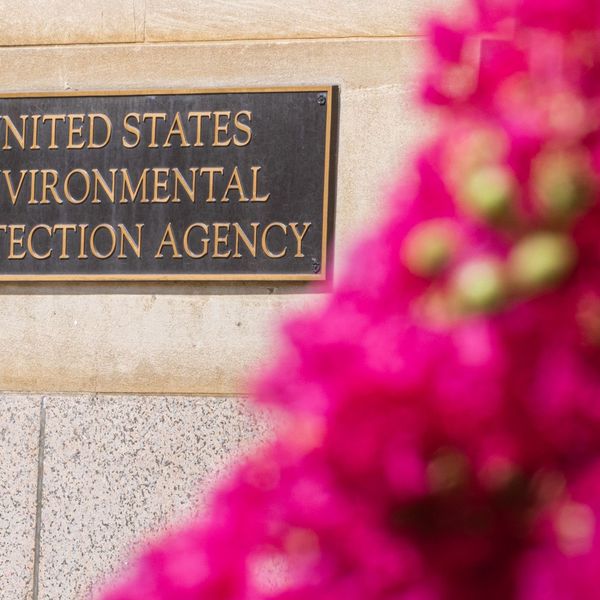Internal Watchdog Blasts EPA's Egregious Delay on Flint Emergency Order
The EPA 'had the authority and sufficient information' to issue such an order as early as June 2015—but didn't do so until January 2016
The Environmental Protection Agency's (EPA) internal watchdog said Thursday that the agency failed Flint by waiting a full seven months longer than it needed to before issuing an emergency order to protect residents from lead-contaminated water.
The EPA "had the authority and sufficient information" to issue such an order as early as June 2015, read a statement from the agency's Office of Inspector General (OIG)--but didn't do so until January 2016.
"These situations should generate a greater sense of urgency," said EPA inspector general Arthur Elkins. "Federal law provides the EPA with emergency authority to intervene when the safety of drinking water is compromised. Employees must be knowledgeable, trained and ready to act when such a public health threat looms."
According to the Detroit Free Press:
The EPA also knew "state and local authorities were not acting quickly to protect human health," the report said.
"Emergency action ... could have required the city and state to provide alternative water supplies to affected residents, study the extent and severity of lead contamination within the water system, or immediately begin corrective actions to reduce and eliminate lead contamination," the report said.
But no such order was issued then, because the EPA incorrectly "concluded the state's actions were a jurisdictional bar" from doing so, the report said. In fact, the EPA can and should act "if state action is not protecting the public in a timely manner."

As Common Dreams previously reported, the EPA's region 5 office knew as early as April 2015 that Flint's public drinking water was contaminated with high levels of toxins, particularly lead. The EPA's regional director stepped down in late January.
Still, while "the agency's lack of action is indeed scorn-worthy," as Curt Guyette of the ACLU of Michigan wrote this week, it was an "an austerity-driven autocracy" that caused the problem in the first place.
"Flint is unique," he explained, "because the people there had no choice but to use the foul river water being forced on them by the state. In March 2015, the city council voted to return to the cleaner, safer water coming from Detroit's regional system--but the appointed emergency manager overruled the vote, saying the people of Flint couldn't afford anything better than the rust-colored, foul-smelling swill being pumped from the river into their homes."
Guyette continued:
During his sworn testimony in front of Congress, Gov. Rick Snyder described the Flint water disaster as a "failure of government at all levels." That description is maddening, and not just because of its intentional passivity. It was, first of all, not a failure, but a series of deliberate actions that lead to the poisoning of a city.
Moreover, when he talks about the failure of government at all levels, that implies that there was something akin to an actual democracy in place in Flint. But that wasn't the case. Democracy had been hijacked, with an austerity-driven autocracy installed in its place.
Meanwhile, some Flint residents still don't have access to clean water. On Tuesday, the ACLU of Michigan and the Education Law Center filed a class-action lawsuit, accusing the state of violating disability laws by not providing adequate special education services for children in Flint, even as exposure to lead has meant more children in the city require such services.
An Urgent Message From Our Co-Founder
Dear Common Dreams reader, The U.S. is on a fast track to authoritarianism like nothing I've ever seen. Meanwhile, corporate news outlets are utterly capitulating to Trump, twisting their coverage to avoid drawing his ire while lining up to stuff cash in his pockets. That's why I believe that Common Dreams is doing the best and most consequential reporting that we've ever done. Our small but mighty team is a progressive reporting powerhouse, covering the news every day that the corporate media never will. Our mission has always been simple: To inform. To inspire. And to ignite change for the common good. Now here's the key piece that I want all our readers to understand: None of this would be possible without your financial support. That's not just some fundraising cliche. It's the absolute and literal truth. We don't accept corporate advertising and never will. We don't have a paywall because we don't think people should be blocked from critical news based on their ability to pay. Everything we do is funded by the donations of readers like you. Will you donate now to help power the nonprofit, independent reporting of Common Dreams? Thank you for being a vital member of our community. Together, we can keep independent journalism alive when it’s needed most. - Craig Brown, Co-founder |
The Environmental Protection Agency's (EPA) internal watchdog said Thursday that the agency failed Flint by waiting a full seven months longer than it needed to before issuing an emergency order to protect residents from lead-contaminated water.
The EPA "had the authority and sufficient information" to issue such an order as early as June 2015, read a statement from the agency's Office of Inspector General (OIG)--but didn't do so until January 2016.
"These situations should generate a greater sense of urgency," said EPA inspector general Arthur Elkins. "Federal law provides the EPA with emergency authority to intervene when the safety of drinking water is compromised. Employees must be knowledgeable, trained and ready to act when such a public health threat looms."
According to the Detroit Free Press:
The EPA also knew "state and local authorities were not acting quickly to protect human health," the report said.
"Emergency action ... could have required the city and state to provide alternative water supplies to affected residents, study the extent and severity of lead contamination within the water system, or immediately begin corrective actions to reduce and eliminate lead contamination," the report said.
But no such order was issued then, because the EPA incorrectly "concluded the state's actions were a jurisdictional bar" from doing so, the report said. In fact, the EPA can and should act "if state action is not protecting the public in a timely manner."

As Common Dreams previously reported, the EPA's region 5 office knew as early as April 2015 that Flint's public drinking water was contaminated with high levels of toxins, particularly lead. The EPA's regional director stepped down in late January.
Still, while "the agency's lack of action is indeed scorn-worthy," as Curt Guyette of the ACLU of Michigan wrote this week, it was an "an austerity-driven autocracy" that caused the problem in the first place.
"Flint is unique," he explained, "because the people there had no choice but to use the foul river water being forced on them by the state. In March 2015, the city council voted to return to the cleaner, safer water coming from Detroit's regional system--but the appointed emergency manager overruled the vote, saying the people of Flint couldn't afford anything better than the rust-colored, foul-smelling swill being pumped from the river into their homes."
Guyette continued:
During his sworn testimony in front of Congress, Gov. Rick Snyder described the Flint water disaster as a "failure of government at all levels." That description is maddening, and not just because of its intentional passivity. It was, first of all, not a failure, but a series of deliberate actions that lead to the poisoning of a city.
Moreover, when he talks about the failure of government at all levels, that implies that there was something akin to an actual democracy in place in Flint. But that wasn't the case. Democracy had been hijacked, with an austerity-driven autocracy installed in its place.
Meanwhile, some Flint residents still don't have access to clean water. On Tuesday, the ACLU of Michigan and the Education Law Center filed a class-action lawsuit, accusing the state of violating disability laws by not providing adequate special education services for children in Flint, even as exposure to lead has meant more children in the city require such services.
The Environmental Protection Agency's (EPA) internal watchdog said Thursday that the agency failed Flint by waiting a full seven months longer than it needed to before issuing an emergency order to protect residents from lead-contaminated water.
The EPA "had the authority and sufficient information" to issue such an order as early as June 2015, read a statement from the agency's Office of Inspector General (OIG)--but didn't do so until January 2016.
"These situations should generate a greater sense of urgency," said EPA inspector general Arthur Elkins. "Federal law provides the EPA with emergency authority to intervene when the safety of drinking water is compromised. Employees must be knowledgeable, trained and ready to act when such a public health threat looms."
According to the Detroit Free Press:
The EPA also knew "state and local authorities were not acting quickly to protect human health," the report said.
"Emergency action ... could have required the city and state to provide alternative water supplies to affected residents, study the extent and severity of lead contamination within the water system, or immediately begin corrective actions to reduce and eliminate lead contamination," the report said.
But no such order was issued then, because the EPA incorrectly "concluded the state's actions were a jurisdictional bar" from doing so, the report said. In fact, the EPA can and should act "if state action is not protecting the public in a timely manner."

As Common Dreams previously reported, the EPA's region 5 office knew as early as April 2015 that Flint's public drinking water was contaminated with high levels of toxins, particularly lead. The EPA's regional director stepped down in late January.
Still, while "the agency's lack of action is indeed scorn-worthy," as Curt Guyette of the ACLU of Michigan wrote this week, it was an "an austerity-driven autocracy" that caused the problem in the first place.
"Flint is unique," he explained, "because the people there had no choice but to use the foul river water being forced on them by the state. In March 2015, the city council voted to return to the cleaner, safer water coming from Detroit's regional system--but the appointed emergency manager overruled the vote, saying the people of Flint couldn't afford anything better than the rust-colored, foul-smelling swill being pumped from the river into their homes."
Guyette continued:
During his sworn testimony in front of Congress, Gov. Rick Snyder described the Flint water disaster as a "failure of government at all levels." That description is maddening, and not just because of its intentional passivity. It was, first of all, not a failure, but a series of deliberate actions that lead to the poisoning of a city.
Moreover, when he talks about the failure of government at all levels, that implies that there was something akin to an actual democracy in place in Flint. But that wasn't the case. Democracy had been hijacked, with an austerity-driven autocracy installed in its place.
Meanwhile, some Flint residents still don't have access to clean water. On Tuesday, the ACLU of Michigan and the Education Law Center filed a class-action lawsuit, accusing the state of violating disability laws by not providing adequate special education services for children in Flint, even as exposure to lead has meant more children in the city require such services.

